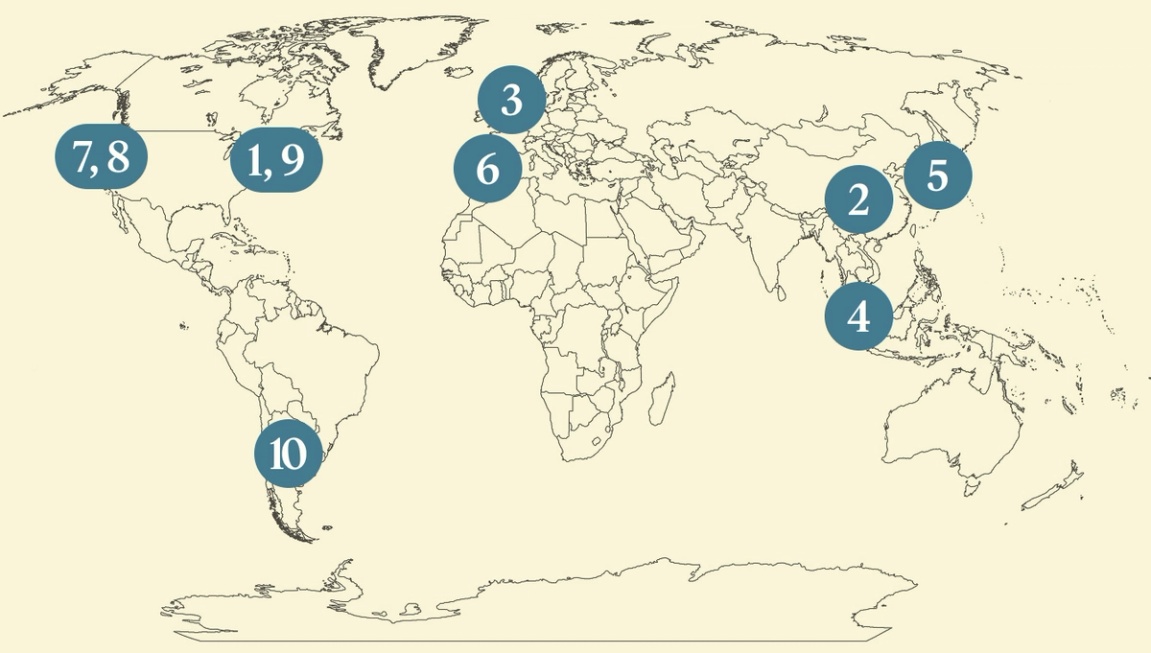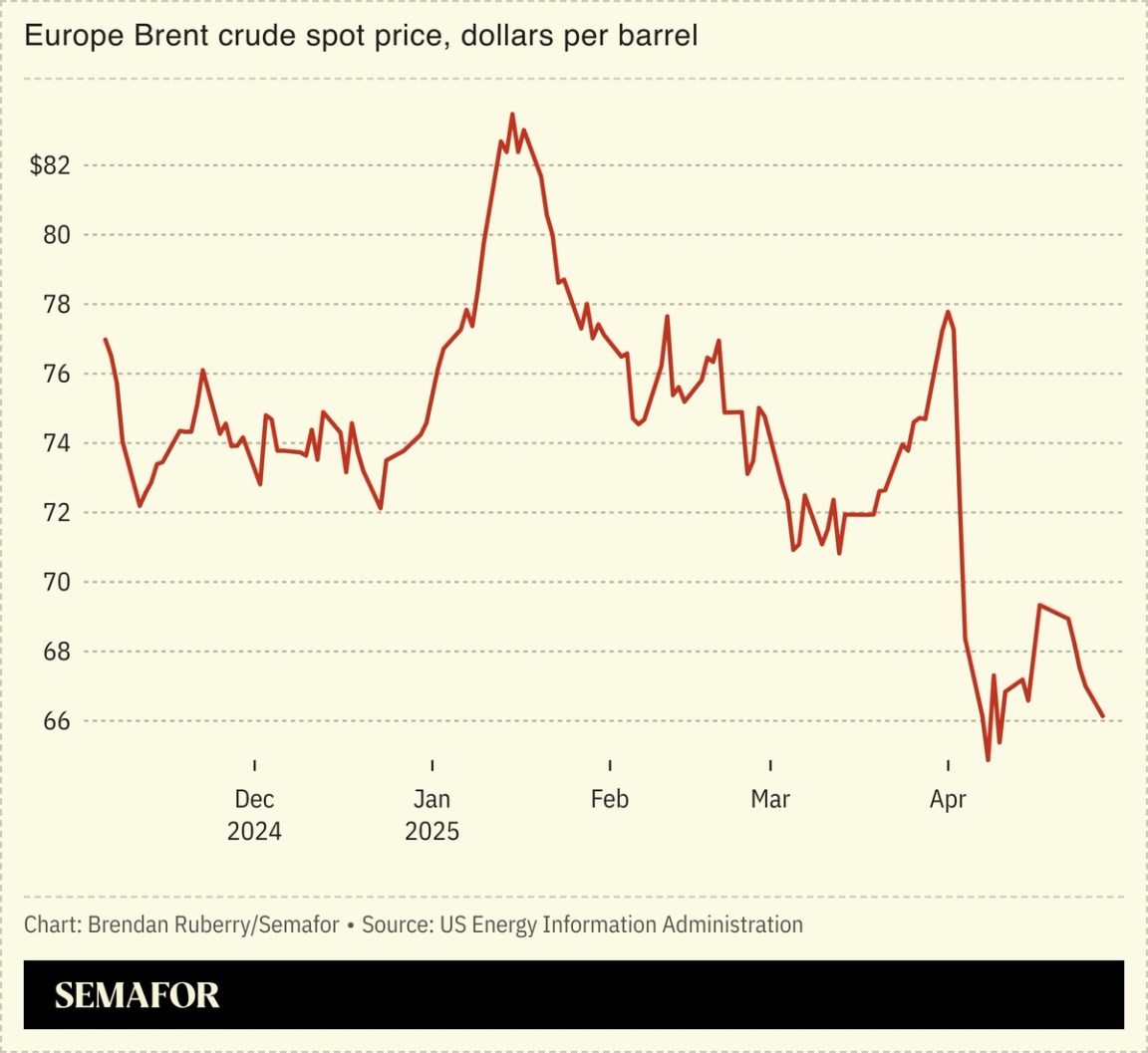| | Donald Trump ousts Mike Waltz, more political chaos hits South Korea, and Natasha Lyonne is directin͏ ͏ ͏ ͏ ͏ ͏ |
| |  | Flagship |  |
| |
|
The World Today |  - Trump ousts Mike Waltz
- End of a global trade era
- Oil firm revenues hit
- Singapore election unease
- SK presidential race chaos
- Lessons from a blackout
- Meta AI copyright case
- Sci-fi movie with AGI
- Office demand is back
- Secret Nazi files released
 A new exhibition in the UK focuses on portraits of artists — made by other artists. |
|
Trump ousts national security adviser |
 Kevin Mohatt/Reuters Kevin Mohatt/ReutersUS President Donald Trump ousted his national security adviser Mike Waltz Thursday, following a controversy last month when Waltz accidentally added a journalist to a group chat where military plans were discussed. But Waltz — who Trump has now nominated as UN ambassador — was on the outs in the president's orbit even before “Signalgate,” sources told Semafor: His traditionally hawkish views of national security created tension with more isolationist players in the White House. One source described Waltz as too “neocon” for his colleagues. His removal is troubling for Washington’s European allies, The Economist’s defense editor wrote: “Many have been concerned that Waltz's firing would expand [the] influence of more radical MAGA types.” |
|
Last of pre-tariff Chinese goods arrive |
 The impact of US President Donald Trump’s trade war with Beijing will crash onto American shores next week, as shipments from China plummet. Because it takes weeks for a ship to travel across the Pacific Ocean, the last Chinese goods that were loaded ahead of the 145% tariffs are now docking at US ports. Analysts expect empty shelves, higher prices, and layoffs to become a reality in the US within weeks. The drop in shipments will be amplified by the end of the de minimis loophole on Friday; the exemption allows packages under $800 to avoid duties. “There’s a lot of ships just sitting there off the coast of China, waiting and expecting a deal,” a supply chain executive said. |
|
Oil profits take a hit in trade war |
 There are signs that the oil and gas industry is already feeling the impact of US President Donald Trump’s shakeup of the global trade system. Profits for several European giants fell in the first quarter, and an US shale driller last week said it would need to shut down a rig because of falling oil prices: Crude slid below $60 per barrel in the US — its lowest point since the pandemic — threatening oil companies’ profitability. BP reported weaker-than-expected earnings this week, in a warning sign for Chevron, ExxonMobil, and Shell, which report earnings Friday. It’s too soon to glean the full toll of the trade war on the industry, Semafor’s Tim McDonnell wrote, “but red flags are going up.” |
|
Singapore election tests ruling party |
 Edgar Su/Reuters Edgar Su/ReutersSingapore votes in a general election Saturday as tariff-fueled economic unease looms over the trade-dependent city-state. Despite being spared the worst of US President Donald Trump’s “Liberation Day” duties, Singapore’s heavy reliance on international trade means global supply chain uncertainty hurts manufacturing, said ING analysts, who downgraded Singapore’s annual GDP growth projection to 1.6%. The economic challenges, including a cost-of-living crisis, pose a test for Singapore’s ruling party, which has been in power since before the country’s independence in 1965 but has become increasingly vulnerable. The son of Singapore’s founder argued that the country is no longer “an oasis of… prosperity,” writing: “Singapore is still an autocracy but no longer the benevolent one my father envisioned.” |
|
Political chaos engulfs SKorea |
 Kim Hong-Ji/Reuters Kim Hong-Ji/ReutersSouth Korea was roiled by more political chaos Thursday, one month out from the country’s presidential election. Within the span of a day, a court ordered the contest’s frontrunner to face a new trial over alleged election law violations; the country’s acting president resigned and hinted he might enter the race; and the finance minister — who was set to take over as interim leader — stepped down following an impeachment attempt. The developments reflected the political disarray that has engulfed Seoul following former president Yoon Suk Yeol’s botched martial law declaration last year. Korean politics “has become utterly paralyzed,” a local expert wrote. But it “has always been a drama, and its ending can never be predicted until the very last moment.” |
|
Blackout offers green energy lessons |
 Spain’s heavy reliance on solar power is under scrutiny after the mass blackout across the Iberian Peninsula this week, but experts said the incident offers more nuanced lessons about renewables. The exact cause of the outage is yet to be determined, but some argued that it highlighted how renewable-heavy grids are failure-prone. However, experts said renewables should not bear the blame: Reuters’ energy columnist wrote that the issue is more the “management of renewables in the modern grid,” while an expert told The Economist that similar failures could even grind fossil-fuel-heavy grids to a halt. The answer, analysts said, lies in upping investments in power storage and grid upgrades to keep up with renewable expansion, and ensuring robust backup systems for outages. |
|
Early test of AI copyright question |
 Nathan Howard/Reuters Nathan Howard/ReutersA US judge was set to hear arguments Thursday in a case that could determine how large tech companies train their artificial intelligence models. A group of authors, including Ta-Nehisi Coates and comedian Sarah Silverman, accused Meta of illegally using pirated versions of their books to refine its Llama AI model. Microsoft, OpenAI, and Anthropic face similar legal challenges, and the Meta case holds “wide-reaching implications in the fierce copyright battle between artists and AI groups,” the Financial Times wrote. Meta argues its tactics qualify as “fair use” because it’s using the works to create transformative technology. The judge’s decision could “send ripples throughout the other cases,” one expert said, with the debate possibly destined for the US Supreme Court. |
|
 What do all budding billionaires have in common? They spend 5-minutes every morning reading The Hustle. The Hustle’s daily newsletter is a breezy, 5-minute morning read that keeps you sharp on everything business and tech. Join 2m+ innovators and sign up today. |
|
 Asteria AsteriaNatasha Lyonne, the star of Orange is the New Black and Russian Doll, will direct a sci-fi movie using generative artificial intelligence. The use of AI in filmmaking is a hot topic in Hollywood: While the Oscars said recently that films made using AI would be eligible for awards, more than 400 artists signed a letter last month criticizing OpenAI and Google for training models on copyrighted material, arguing that it exploited their work. And in 2023, the threat of AI creating digital replicas of actors fueled an industry-wide strike. Uncanny Valley, Lyonne’s project, will include visuals made by the AI company Asteria, which said it compensated artists for the footage it trained its model on. |
|
High-end office market heats up |
 Related Cos. Related Cos.Deloitte agreed to lease nearly three-quarters of the office space of a planned New York City skyscraper, suggesting that the high-end commercial real estate market may be heating up. The accounting giant will occupy 800,000 square feet, The Wall Street Journal reported. Office space demand slumped after COVID-19 and the rise of remote working, meaning that vacancy rates in many big cities — including New York and London — reached record highs. Those rates have been falling, as companies call for a return to the office, but new construction has been limited: Deloitte’s new home, a more-than-60-floor tower on Manhattan’s West Side, will be the largest new development since the pandemic, as developers scramble to meet the rising demand. |
|
|